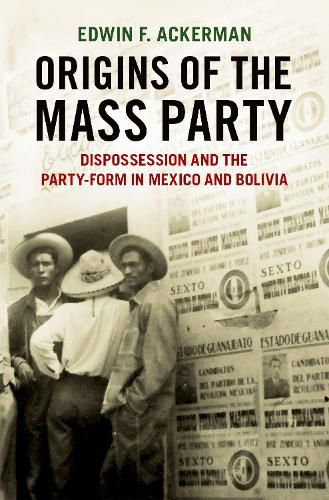Readings Newsletter
Become a Readings Member to make your shopping experience even easier.
Sign in or sign up for free!
You’re not far away from qualifying for FREE standard shipping within Australia
You’ve qualified for FREE standard shipping within Australia
The cart is loading…






In Mexico (1921) and Bolivia (1952), nationalist insurrections with armies largely composed of peasants triumphed over oligarchical regimes. In the aftermath of these uprisings, parties led by members of an urban middle-class intelligentsia adopting a populist agrarian discourse attempted to incorporate this predominantly peasant base. The outcomes of these efforts were, however, radically different.In Origins of the Mass Party, Edwin F. Ackerman tells the stories of the Partido Revolucionario Institucional (PRI) as a mass party in post-revolutionary Mexico (1929-1946), and the attempt but ultimate failure of Bolivia’s Movimiento Nacionalista Revolucionario (MNR) (1953-1964) to do the same. As he shows, Mexico’s PRI successfully mobilized peasants into party politics, translating the insurrectionary effervescence of the peasantry into organizational incorporation. Bolivia’s MNR, in contrast, attempted but failed to undertake a homologous process. To shed light on why this happened, Ackerman examines the historical conditions necessary for the emergence of the mass political parties, offering insights into the persistence of parties over time by linking the economic dispossession that makes it possible to articulate individuals into a political bloc, and the political dispossession that produces professional politicians to undertake articulation and create constituencies. He argues that parties are the predominant form of political mobilization at a global scale, even in an age of dissatisfaction with conventional organization and persistent experimentation with new forms of association. Both comparative and historical in scope, Origins of the Mass Party seeks to show why there is such a strong bond between the party-form and the contemporary world by highlighting the connection between capitalism, modern-state formation, and the party-form.
$9.00 standard shipping within Australia
FREE standard shipping within Australia for orders over $100.00
Express & International shipping calculated at checkout
In Mexico (1921) and Bolivia (1952), nationalist insurrections with armies largely composed of peasants triumphed over oligarchical regimes. In the aftermath of these uprisings, parties led by members of an urban middle-class intelligentsia adopting a populist agrarian discourse attempted to incorporate this predominantly peasant base. The outcomes of these efforts were, however, radically different.In Origins of the Mass Party, Edwin F. Ackerman tells the stories of the Partido Revolucionario Institucional (PRI) as a mass party in post-revolutionary Mexico (1929-1946), and the attempt but ultimate failure of Bolivia’s Movimiento Nacionalista Revolucionario (MNR) (1953-1964) to do the same. As he shows, Mexico’s PRI successfully mobilized peasants into party politics, translating the insurrectionary effervescence of the peasantry into organizational incorporation. Bolivia’s MNR, in contrast, attempted but failed to undertake a homologous process. To shed light on why this happened, Ackerman examines the historical conditions necessary for the emergence of the mass political parties, offering insights into the persistence of parties over time by linking the economic dispossession that makes it possible to articulate individuals into a political bloc, and the political dispossession that produces professional politicians to undertake articulation and create constituencies. He argues that parties are the predominant form of political mobilization at a global scale, even in an age of dissatisfaction with conventional organization and persistent experimentation with new forms of association. Both comparative and historical in scope, Origins of the Mass Party seeks to show why there is such a strong bond between the party-form and the contemporary world by highlighting the connection between capitalism, modern-state formation, and the party-form.